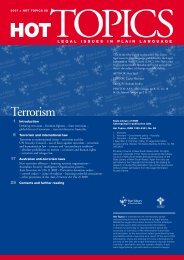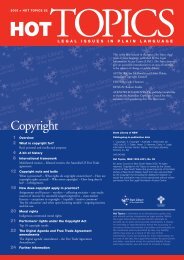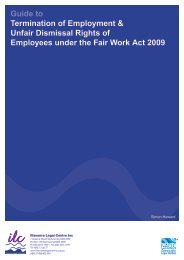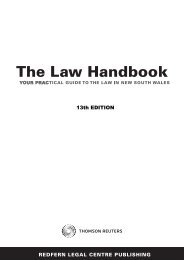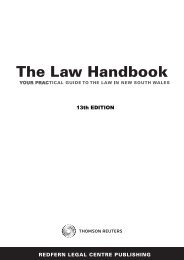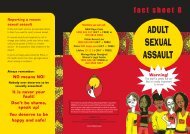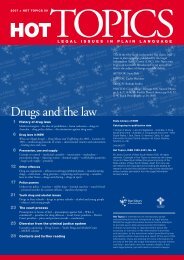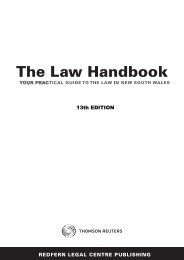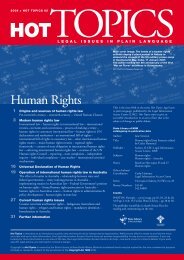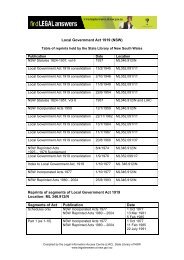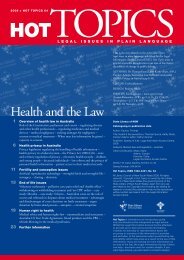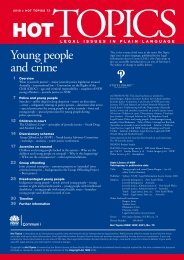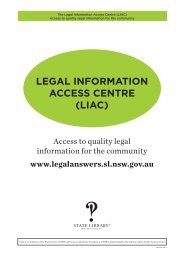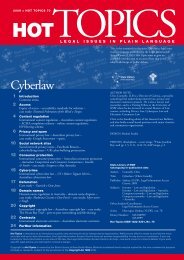Shelter - Hot Topics 57 - Legal Information Access Centre - NSW ...
Shelter - Hot Topics 57 - Legal Information Access Centre - NSW ...
Shelter - Hot Topics 57 - Legal Information Access Centre - NSW ...
- No tags were found...
You also want an ePaper? Increase the reach of your titles
YUMPU automatically turns print PDFs into web optimized ePapers that Google loves.
WHaT iS OWNerSHip?<strong>Legal</strong>ly speaking, a person who owns a house may be saidto own ‘freehold’ or to ‘hold the land of the Crown in theright of the State (New South Wales).’ Alternatively, theymay be said to hold ‘an estate in fee simple.’ Alternativelyagain, they may be said to have ‘title’ in relation to theproperty. What do these things mean?The first two formulations come from real propertylaw’s roots in feudal English law. In the Middle Ages,possession of land was held by arrangement with the localfeudal lord, who in turn held their lands from anothersuperior lord and, ultimately, from the King. The termson which persons held land – that is, their ‘tenure’ (fromthe Latin ‘tenere’, meaning ‘to hold’) – varied, and rangedfrom performing military services for the lord (‘knightservice’), religious services (‘frankalmoin’) to variousagricultural duties (‘free and common socage’). Overthe centuries, the value of these services diminished, theintermediary lords dropped out of the relation betweenland holder and the King, and the Tenures Abolition Act1660 converted all tenures to free and common socageand abolished the remaining incidental duties of thetenure. New South Wales, of course, never had feudallords, but imported the doctrine of tenure with the restof English law. Today, the tenure of free and commonsocage is generally referred to as ‘freehold,’ and the lawstill recognises that, at least theoretically, the land is held‘of the Crown.’The formulation ‘estate in fee simple’ also comes fromthe feudal roots of real property law. The legal right thattenure invested in a landholder was called an ‘estate.’ Aperson did not own the land itself so much as their estatein the land, and the estate is the thing that entitled themto possession. In the face of the permanence of land,the law devised estates of different duration, and thereremain two freehold estates under the law of New SouthWales today. The most common is the ‘estate in feesimple,’ which the holder can dispose of while they arestill alive, or pass on to any of their heirs after death, andwhich is most associated with ‘ownership’ of property.The other is the ‘life estate’, which lasts as long as theholder is alive, and cannot be passed on after death. Bothentitle the holder to possession of the land, but the feesimple is said to be the ‘larger’ of the two estates, becausea person holding an estate in fee simple can grant anotherperson a life estate in relation to the property, but notvice versa. Where the holder of a fee simple grants alife estate, they also create another legal interest (eithera ‘reversion’ or a ‘remainder’) that returns the right ofpossession when the life estate ends.image u navailableThe Kerrigan family from the movie the castle, who defend the principle tht ‘a man’s home is his castle’,(1997) Working Dog Pty Ltd.ownership and possession 5



